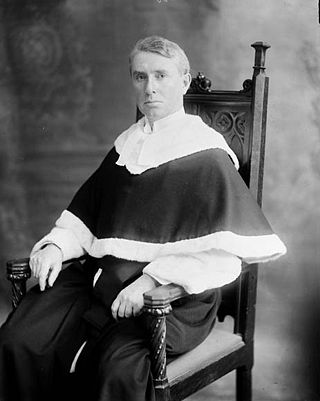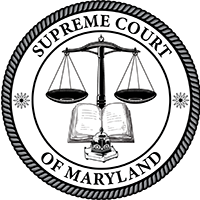In the United States, a state supreme court is the highest court in the state judiciary of a U.S. state. On matters of state law, the judgment of a state supreme court is considered final and binding in both state and federal courts.
In the United States, a state court has jurisdiction over disputes with some connection to a U.S. state. State courts handle the vast majority of civil and criminal cases in the United States; the United States federal courts are far smaller in terms of both personnel and caseload, and handle different types of cases. States often provide their trial courts with general jurisdiction and state trial courts regularly have concurrent jurisdiction with federal courts. Federal courts are courts of limited jurisdiction and their subject-matter jurisdiction arises only under federal law.

The United States district courts are the trial courts of the U.S. federal judiciary. There is one district court for each federal judicial district. Each district covers one U.S. state or a portion of a state. There is at least one federal courthouse in each district, and many districts have more than one. District court decisions are appealed to the U.S. court of appeals for the circuit in which they reside, except for certain specialized cases that are appealed to the U.S. Court of Appeals for the Federal Circuit or directly to the U.S. Supreme Court.
A county court is a court based in or with a jurisdiction covering one or more counties, which are administrative divisions within a country, not to be confused with the medieval system of county courts held by the high sheriff of each county.
The Courts of England and Wales, supported administratively by His Majesty's Courts and Tribunals Service, are the civil and criminal courts responsible for the administration of justice in England and Wales.

A justice of the peace (JP) is a judicial officer of a lower court, elected or appointed by means of a commission to keep the peace. In past centuries the term commissioner of the peace was often used with the same meaning. Depending on the jurisdiction, such justices dispense summary justice or merely deal with local administrative applications in common law jurisdictions. Justices of the peace are appointed or elected from the citizens of the jurisdiction in which they serve, and are usually not required to have any formal legal education in order to qualify for the office. Some jurisdictions have varying forms of training for JPs.

The term magistrate is used in a variety of systems of governments and laws to refer to a civilian officer who administers the law. In ancient Rome, a magistratus was one of the highest ranking government officers, and possessed both judicial and executive powers. In other parts of the world, such as China, magistrate is a word applied to a person responsible for administration over a particular geographic area. Today, in some jurisdictions, a magistrate is a judicial officer who hears cases in a lower court, and typically deals with more minor or preliminary matters. In other jurisdictions, magistrates are typically trained volunteers appointed to deal with criminal and civil matters in their local areas.

In the United States, a district attorney (DA), county attorney, county prosecutor, state's attorney, prosecuting attorney, commonwealth's attorney, state attorney or solicitor is the chief prosecutor or chief law enforcement officer representing a U.S. state in a local government area, typically a county or a group of counties. The exact scope of the office varies by state. Generally, the prosecutor represents the people of the jurisdiction in the state's courts. With the exception of three states, district attorneys are elected, unlike similar roles in other common law jurisdictions.
Circuit courts are court systems in several common law jurisdictions. It may refer to:

District courts are a category of courts which exists in several nations, some call them "small case court" usually as the lowest level of the hierarchy.

The Supreme Court of Maryland is the highest court of the U.S. state of Maryland. The court, which is composed of one chief justice and six associate justices, meets in the Robert C. Murphy Courts of Appeal Building in the state capital, Annapolis. The term of the Court begins the second Monday of September. The Court is unique among American courts in that the justices wear red robes.

The government of Maryland is conducted according to the Maryland Constitution. The United States is a federation; consequently, the government of Maryland, like the other 49 state governments, has exclusive authority over matters that lie entirely within the state's borders, except as limited by the Constitution of the United States.
The structure of the judiciary of Texas is laid out in Article 5 of the Constitution of Texas and is further defined by statute, in particular the Texas Government Code and Texas Probate Code. The structure is complex, featuring many layers of courts, numerous instances of overlapping jurisdiction, several differences between counties, as well as an unusual bifurcated appellate system at the top level found in only one other state: Oklahoma. Municipal Courts are the most active courts, with County Courts and District Courts handling most other cases and often sharing the same courthouse.

There are various levels of judiciary in England and Wales—different types of courts have different styles of judges. They also form a strict hierarchy of importance, in line with the order of the courts in which they sit, so that judges of the Court of Appeal of England and Wales are given more weight than district judges sitting in county courts and magistrates' courts. On 1 April 2020 there were 3,174 judges in post in England and Wales. Some judges with United Kingdom-wide jurisdiction also sit in England and Wales, particularly Justices of the United Kingdom Supreme Court and members of the tribunals judiciary.
The District Court is the lowest court in the Irish court system and the main court of summary jurisdiction in Ireland. It has responsibility for hearing minor criminal matters, small civil claims, liquor licensing, and certain family law applications. It is also responsible for indicting the accused and sending them forward for trial at the Circuit Court and Central Criminal Court.
The District Court of Maryland for Baltimore County District Courthouses are located in Towson, Catonsville and Essex and serve as the courts of first impression for the majority of residents in the state of Maryland. Jurisdiction of the District Court includes most landlord- tenant cases, small claims for amounts up to $5,000, replevin actions, motor vehicle violations, misdemeanors, certain felonies, and peace and protective orders. The District Courts also have concurrent jurisdiction with the Circuit Court over civil lawsuits where the amount in controversy is between $5,001 and $30,000.
The Circuit Courts of Maryland are the state trial courts of general jurisdiction in Maryland. They are Maryland's highest courts of record exercising original jurisdiction at law and in equity in all civil and criminal matters, and have such additional powers and jurisdiction as conferred by the Maryland Constitution of 1867 as amended, or by law. The Circuit Courts also preside over divorce and most family law matters. Probate and estate matters are handled by a separate Orphans' Court. The Circuit Courts are the only Maryland state courts empowered to conduct jury trials.

The Baltimore City Sheriff's Office is the law enforcement arm of the Circuit Court of Maryland, serving Baltimore, Maryland. The office is headquartered in Courthouse West of the Baltimore City Circuit Courthouses, which also serves as the sites for Baltimore City branch of the Circuit Court of Maryland.
In the United States, an independent city is a city that is not in the territory of any county or counties and is considered a primary administrative division of its state. Independent cities are classified by the United States Census Bureau as "county equivalents" and may also have similar governmental powers to a consolidated city-county or a unitary authority. However, in the case of a consolidated city-county, a city and a county were merged into a unified jurisdiction in which the county at least nominally exists to this day, whereas an independent city was legally separated from any county or merged with a county that simultaneously ceased to exist even in name.
The County Court is a national civil court for England and Wales with unlimited financial jurisdiction.










